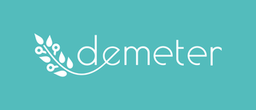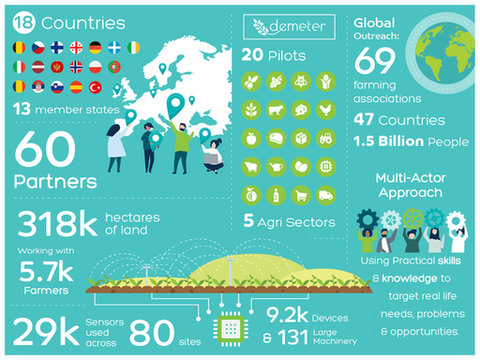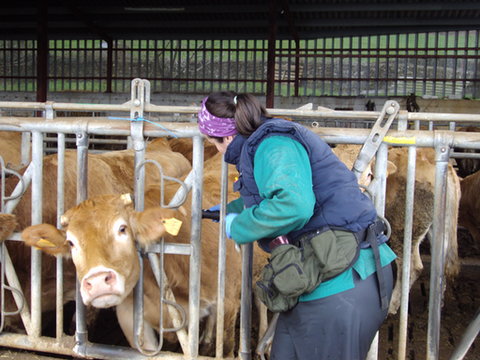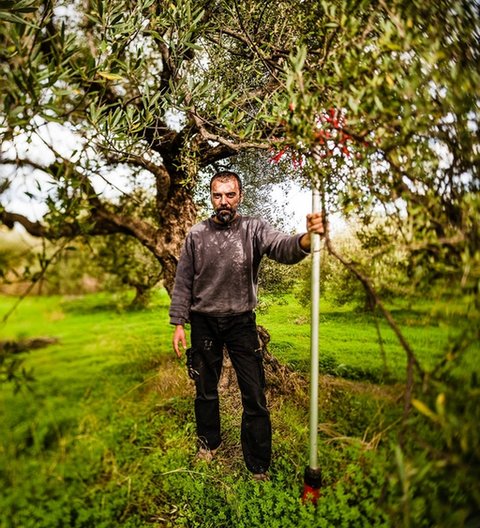
This Newsletter issue focuses on "a new generation of innovators" and how young people can help in promoting smart farming for a more sustainable agriculture. We also highlight the importance of gender diversity in agri-tech. What is DEMETER’ view on this subject?
Encouraging young people to promote smart farming is critical in ensuring the long-term resilience and sustainability of the agriculture sector. This not only means encouraging young farmers to use these technologies but also ensuring that farming is seen as an attractive, modern, and challenging career. It is clear, therefore, that farmers need to have access to education and training to encourage participation, but also to have the opportunity to engage with other farmers actively using such technologies to learn more.
One of our key objectives in DEMETER is to demonstrate the impact of digital innovations across a variety of sectors and at European level. We deploy smart technologies through a series of 20 pilots across 18 countries focusing on clusters relating to arable crops, precision farming, fruit and vegetables, livestock health and welfare and the agri-food supply chain. These pilot projects are used to evaluate the benefit of agri innovations and to demonstrate how such innovations can help farmers to improve their decision-making. We hope that hearing the experiences of farmers, young and old, participating in DEMETER will demonstrate the value of using smart farming technologies.
Furthermore, we aim to empower the farmer, as a prosumer, to gain control in the data-food-chain by identifying and demonstrating a series of new IoT-based, data-driven, business models for profit, collaboration, and co-production for farmers and across the value chain, leading to disruptive new value creation models. This is important for promoting farming as an attractive career opportunity.
Equally, we need to ensure that young technology developers are developing solutions that meet farmers’ needs and consider their feedback at all stages of development. In DEMETER, we advocate a multi-actor approach and through farmer interviews and surveys we can see the benefit of farmers being part of the discussion. We are developing a Stakeholder Open Collaboration Space (SOCS) which is an online platform dedicated to all stakeholders (farmers, advisors, and suppliers) where they can collaborate, share best practices and participate in the co-creation processes.
Finally, in relation to gender diversity, DEMETER ensures the active engagement and participation of female farmers in the project, its exploitation and in our open calls. We also strive to achieve a gender balance within our consortium and seek to increase our gender balance across our evaluation and advisory roles. Our recent webinar in association with SmartAgriHubs really highlighted the appetite for change in Europe and we are committed to continuing to work in this gender diversity space.
How does DEMETER contribute to promoting innovation and ensuring gender-balance in the agriculture sector?
We need to ensure that technologies are being promoted for the benefits that they deliver and highlight how data sharing from farmers can add value in terms of increased yields or financial returns. We have produced a pilot booklet which explains each of our pilots and the benefit for farmers and technology providers. This booklet is available in sixteen languages, ensuring that not only English-speaking farmers can learn about the technologies and the DEMETER project. We actively participate in workshops, seminars and conferences to raise awareness of DEMETER and the work to drive the digitisation of the agrifood sector. For example, we will be exhibiting at the upcoming United Nations COP 26 (Sustainability) conference in November to help promote how digital technologies are increasing agricultural sustainability. We will be sharing videos and testimonials from many of the farmers participating in the project.
While gender does not have a significant impact on the core DEMETER technologies, it does play an important role in the application of the developed technologies, their acceptance and adoption. Differences related to the effectiveness and usability of the piloted solutions emanating from gender, social and cultural perspectives are consistently taken into consideration particularly in our evaluation and technology acceptance activities. Within our piloting activities, we are currently contacting the leads of the 20 pilot projects to bring gender equality to the fore. For our publications and events, we actively work to ensure a good gender balance is delivered, where possible.
DEMETER and SmartAgriHubs share the same values and objectives. How Does DEMETER connect with the SmartAgriHubs project?
DEMETER has multiple points of connection with SmartAgriHubs. We share quite a few partners in common and have undertaken a number of joint workshops and presentations. Our most recent was the Gender in Agritech webinar which ran on October 15th and highlighted how working together on common goals and interests delivers an even better output.
We have also engaged on common technical approaches where possible, in particular around the Common European Agricultural Data Spaces initiative. Additionally, we share initiatives that SmartAgriHubs promotes such as Open Calls and the Gender Equality Taskforce. We have taken also taken advantage of the SmartAgriHubs Innovation Portal to share DEMETER initiatives and activities.
What opportunities do you see for (more) synergy between the projects?
We need to build more on our joint research. The Common European Agricultural Data Spaces is a good place to focus as there are many overlaps between the technologies in focus in each project (and indeed in other projects such as NIVA, ATLAS, etc). A common workshop on best practices in agri tech interoperability / architecture would be timely. Joint academic publications, whitepapers, webinars and news articles is another area where we can combine efforts.

This project has received funds from the European Union’s Horizon 2020 research and innovation programme under Grant Agreement No 727520
DEMETER in a glance

DEMETER is a H2020 project, supporting the large-scale deployment of farmer-driven, interoperable smart farming-IoT (Internet of Things) based platforms, delivered through a series of 20 pilots across 18 countries (15 EU countries).


